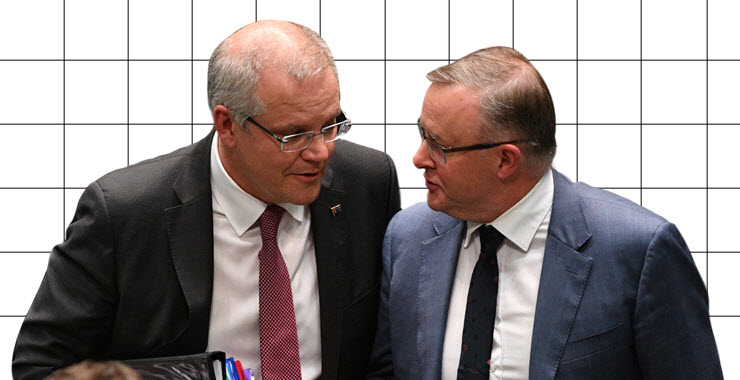
Politicians often play against type, either for strategic reasons or because of circumstance. However, at the moment we have some serious role reversals going on in Canberra. As both sides take on the roles usually reserved for once another, both supporters and the target of all this confused signalling — business — are very much lost in translation.
This morning, Labor’s Anthony Albanese, who is still working on just what his persona should be — despite more than three decades in parliament — has been cuddling up to the Business Council of Australia (BCA), a lobby group that owns the expression “big end of town”.
For some reason, Albanese is smarting from criticism of Labor’s tough anti-corporate language prior to the May election; censure emanating mostly from the big business cheer squad. The recent study by Australian National University’s Centre for Social and Research Methods found Labor’s policies were a net positive and anecdotal evidence supports the view addressing inequality was one of the most popular approaches the ALP adopted.
Despite being a one-time poster boy for the New South Wales Labor hard left, Albo wants to be businesses new best friend. “I want to work with you,” Albanese told the BCA today. “I want us to co-operate to confront the challenges facing our nation. We won’t always agree, but you will always have my respect.”
Last night, Treasurer Josh Frydenberg was the BCA’s keynote speaker at its gala dinner while today Prime Minister Scott Morrison sent along his business-basher in chief, Western Australian MP Ben Morton, to tell executives to look after the “quiet Australians” and forget pandering to socially aware shareholders.
In a world where confusion is the standard response to everything, this might be OK but it does represent a new kind of weird for our politics.
Just 17 months ago, Morrison wanted to give business a $65 billion tax cut (a move that had to be scaled back because of Senate opposition and was credited as the main reason former PM Malcolm Turnbull had his backside kicked at the July 2018 “Super Saturday” byelections). Now he has Morton, his political sidekick, close friend and strategic adviser, out on the annual business conference circuit lecturing corporate leaders.
“When engaging with this government, business should: one, explain how what they are proposing will improve the lives of those quiet Australians we represent,” said Morton. “Two, tell us how they will communicate that to these same people.”
In this, business heard an order to confine their messages and actions to the betterment of government policy and an implicit demand any communications campaigns needed to fit with those of the Morrison government.
To drive home the point, Morton said business had “too often” been on the frontline of social issues but “missing in action when arguing for policies which would grow jobs and the economy”.
These blunt messages, delivered by Morton two weeks in a row, have coincided with the reintroduction of the government’s Treasury Laws Amendment (Prohibiting Energy Market Misconduct) Bill 2018 — known colloquially as the “big stick” law to force energy companies to divest assets if they act in unacceptable ways.
Just about everyone thinks this law is not needed. It’s not clear just what kind of behaviour might offend if it is passed (it didn’t make it through the Senate last year) and these actions were not in any of the recommendations in the ACCC’s very thorough electricity market and prices inquiry.
Business says the bill will deter investment and will become one more, possibly insurmountable, hurdle to achieving a workable, pro-business energy and climate policy in Australia. Former Hawke government economic adviser and Rudd government minister Craig Emerson compared this law to similar divestment legislation passed last year in Venezuela and said it made Morrison the “Don Corleone” of Australian politics.
Walking onto this stage of confusion, Albanese is shaping up as business’ new best friend; saying corporate Australia needs to reflect the values of customers and employees to help redress “the yawning trust deficit” between the public and institutions. Adding that the government’s approach ignored the reality of modern business, Albanese told the BCA the most successful businesses operate in ways that reflect the values of workers and those who consume services or buy products.
“You are not just takers of profits … you see yourself as part of the community.”
Business leaders at tonight’s parliamentary Midwinter Ball can be excused if they’re reaching for the vodka rather than the chardonnay or merlot.
Dennis Atkins is a freelance writer based in Brisbane where he was a national political editor during the Howard government. He is filling in for part of the time while Bernard Keane is enjoying a break.








“known colloquially as the “big stick” law to force energy companies to divest assets if they act in unacceptable ways.”
Who exactly is going to want to buy obsolescent fossil fuel power stations, or mines, when the government is forcing price controls onto the owner? Even without that, they’re an unattractive investment
Please explain how a pro-business energy and climate policy will work where ‘business’ is the dominant polluter.
When leaders of any persuasion or capacity are assessing the relative merits of Albanese and Morrison, they will be able to discern which one is genuine and which is a bull artist.
I wish that ALP and LNP would just get over themselves and come out with their obvious position as one and the same united team. Then we might actually get a Government much as we have already with some new pseudo dissent , and eventually a brand new real opposition.
So, to paraphrase “How bad a PM would Labor’s Anthony Albanese make?” (Morrison’s hands are clean?)
You can understand the Limited News Party’s high dudgeon over business’s failure to do “their bit for the nation” – after the LNP having done so much for them :- anti-union laws; tax cuts (so that business wouldn’t have to pay employees more => more to executive pay-packets); the way they’ve put big donor’s fossil fuels before climate change policy/holding back the nation for coal?
And “in return” business won’t even fight the government’s fight for them …. that is business other than Murdoch’s foreign business won’t fight their fight for them.
They can always count on Rupert – ’til they cross him.